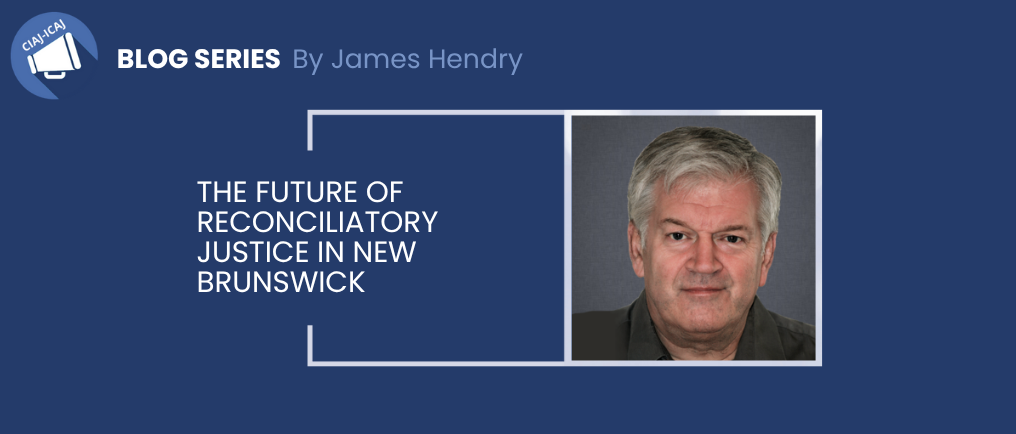The Future of Reconciliatory Justice in New Brunswick

The Future of Reconciliatory Justice in New Brunswick
Meetings often start with an acknowledgement that they are taking place on unceded Aboriginal lands. Few know what the lack of cession means; the path of reconciliation will require us to learn. For example, six Wolastoqey First Nations seek reconciliatory justice in a declaration of Aboriginal title over unceded traditional lands covering more than half of New Brunswick including a quarter million private and industrial freeholds: Wolastoqey Nations v. New Brunswick and Canada, et.al.
The SCC has recognized the central goal of the reconciliation of Crown sovereignty and prior and existing Aboriginal interests as an unwritten constitutional principle. Further, the honour of the Crown, another unwritten constitutional principle, legally binds the Crown to negotiate and resolve land claims in good faith. The SCC said in Delgamuukw that reconciliation involves resolving Aboriginal title claims based on Aboriginal law and common law. Surely only through the mutual acceptance of a legal settlement of these issues can both parties be fairly understood to be bound.
The SCC has said that the rule of law should deliver to citizens and residents a stable, predictable and ordered society. Predictability must include knowing how big issues from the past we share with Aboriginal people might be solved, issues which have unfortunately waited for politicians to solve what they consider to be more immediate problems. The big issues include the question of how to reconcile unilateral assertion of Crown sovereignty and its grants of fee simple with prior Aboriginal sovereignty.
In 2014, McLachlin CJC declared that the Crown does not retain a beneficial interest in Aboriginal title land: Tsilhqot’in. The Crown gets what is left over when the full beneficial interest conferred by Aboriginal title is subtracted from the Crown’s interest by operation of s. 109 of the Constitution Act, 1867. Aboriginal title is an independent and beneficial legal interest, similar to fee simple. McLachlin CJC said it exists because the doctrine that no one owned the land before the Europeans does not apply in Canada.
But if Aboriginal title is proved and the Crown does not have a beneficial interest, how can it grant fee simple title? McLachlin CJC did not have to decide this in Tsilhqot’in because the First Nation did not seek a declaration of title over private and underwater lands.
The “big issue” in the motion to strike in the Wolastoqey case seems to be less about the proof of Aboriginal title, but the consequences of such a finding on so many Crown grants of fee simple. Emotions are running high. The Wolastoqey accused the former Progressive Conservative government of fear mongering. The Wolastoqey have publicly said that they seek to reclaim only undeveloped Crown and industrial lands. They refer to the private freeholders as “Strangers to the Claim” in the pleadings. A Chief said they are not seeking to reclaim land from private individuals but maintain their full claim over all the land claimed to get greater control the future use of the land. Gregory J noted the high emotional atmosphere and noted the Wolastoqey deliberately excluded the individual freeholders apparently to reassure them that their land was not directly in issue.
The motion to strike the Wolastoqey case boiled down to two important issues. Who were the proper parties? And can the courts make a declaration of Aboriginal title where the Crown has granted the subject land in fee simple? (Gregory J earlier struck a claim for a certificate of pending litigation or equivalent notice because the special nature of Aboriginal title does not fit under New Brunswick land titles law (¶130)).
First, Gregory J held that public constitutional law, which involves only the Aboriginal peoples and the Crown under s. 35 of the Constitution Act, 1982, meant the Crown and the Aboriginal claimants were the only proper parties. She observed that constitutional declarations might impact private interests, but that was not the proper basis to include them in purely constitutional litigation. She wrote private parties could not contribute to the claim and that their involvement was a burden to them and the proceedings. Gregory J went on to hold striking the claim against private parties did not deny the Aboriginal group the possibility that the Crown might be directed to expropriate the land from fee simple owners flowing from a declaration of Aboriginal title. But any such order would be against the Crown as the proper party to reconciliation and answerable for compensation for improper land grants made by it.
Second, Gregory J decided the court could grant a declaration of Aboriginal title in the face of existing fee simple interests but held that the declaration could not be granted directly against the freeholders. She allowed the map detailing the entirety of the claim to stand because it showed the limits of the claim against the Crown.
Gregory J anticipated that the action would proceed in stages where a reconciliation phase would follow a finding of Aboriginal title. The Crown will have to take into account the fee simple interests of landowners before the courts should be called to determine a remedy should negotiations aimed at reconciliation be unsuccessful. Gregory J referred to the SCC’s expectation in Restoule that the Crown’s reconciliatory action would involve a “complex polycentric” considerations of the solemnity of its obligations the Aboriginal people and the needs of other Canadians. Private freeholders were still strangers to this process. Gregory J noted that the fee simple rights holders might wish to apply as interveners during the remedial phase of the case.
This Aboriginal title claim will be extremely important for the future of reconciliation. The motions judge tried to separate the legal issues from the broader emotional impact on reconciliation. But the suggestion that the remedy phase of the litigation might lead to a declaration that the Crown should expropriate freeholds is bound to create concern even if the Crown must act as a buffer potentially liable for damages. We have already seen conflict in New Brunswick arising from the exercise of Aboriginal rights and fishers using the same resources. In its reasons rejecting a rehearing in Marshall, the SCC referred to the distinction between Aboriginal rights exclusively exercised by Aboriginal people before Europeans came and treaty rights. The SCC noted construing a treaty dealing with commercial rights might legitimately consider the interests of non-Aboriginals. But the SCC refused to accept the “political argument” that it had no jurisdiction to find that a treaty right should be able to displace any non-Aboriginal commercial fisher.
By recognizing that Aboriginal title could displace a Crown grant of fee simple in determining the proper parties in a contest between the Crown and Aboriginal people, Gregory J may have achieved an important move toward reconciliation. In the spirit of reconciliation, both the Wolastoqey and the new Liberal government in New Brunswick have acknowledged the importance of negotiation rather than litigation as prompted by the SCC. Such resolutions are possible. The Haida approved Land Titles Agreements with British Columbia and Canada that affirm Aboriginal title to the lands of Haida Gwaii while not derogating from fee simple interests.
Three industrial freeholders have received leave to appeal from the Court of Appeal of New Brunswick.

